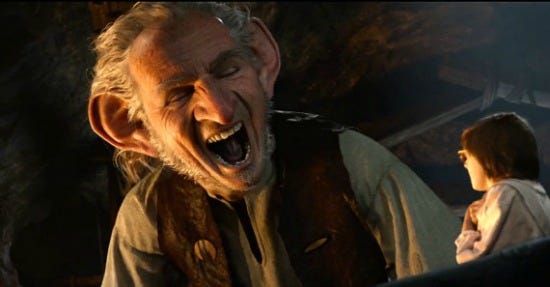The BFG

“The BFG” is a homecoming of sorts, with director Steven Spielberg reuniting with “E.T.: The Extra-Terrestrial” screenwriter Melissa Mathison for the first time. (And, alas, the last: she passed away last year.) The theme and tone of the films are very similar, about lonely children bonding with a fantastical creature who helps them take their first steps into a bigger world.
Based on the Roald Dahl book, it’s a dreamy and delightful tale in which actor Mark Rylance, who won an Oscar playing for Spielberg in last year’s “Bridge of Spies,” is transformed into a 40-foot-tall giant through motion capture and computer animation.
Known simply as the “Big Friendly Giant” — in contrast to his nine fellows, who are crude and crave human flesh — BFG is a cheerily odd fellow with enormous ears and (for his sort) an intellectual bent.
Though he has a habit of using words all wrong or making up new ones to substitute — “gobblefunk,” Dahl called it — BFG is thoughtful and kind. His “work” involves catching dreams, represented as colorful balls of spritely energy, and blowing them into the bedrooms of humans using his trumpet. He can also hear most everything owing to his outsized ears — even, he says, the very stars.
Ruby Barnhill plays Sophie, a young British orphan who spots the BFG at his labors one night. Fearing discovery, he snatches Sophie and takes her to Giant Country, a place of indeterminate geography where he and the other giants live, pilfering human stuff (and sometimes humans) for their amusement.
Sophie, a brave and inquisitive lass, is fearful but intrigued, and figures living with an affable giant certainly beats life at the orphanage. But the threat of discovery from the other giants is ever-present. Even more disturbing, it is apparent that BFG has repeated this act of stealing himself a companion before, with tragic results.
The CGI is just fantastic, married with Rylance’s tender performance. BFG’s quizzical smile, dash of thinning gray hair and crane’s neck make him seem strangely authentic.
Mathison’s script is similarly a marvel, beckoning us in as we explore the spectacle of the giants’ world, but then going further and developing themes about bullying. Indeed, BFG is a mere stripling compared to the other giants, who call him “runt” and mercilessly push him around. Jemaine Clement brings a growly, threatening aspect to their loathsome chief, Fleshlumpeater.
Kids will love the goofy antics and kooky language, which the film frequently combines. For instance, BFG ferments a green drink from snozzcumbers, the vile vegetable he is forced to eat, which he calls throbscottle. The bubbles flow downward instead of up, and instead of burps (which giants find rude) you get … uh, prodigiously forceful emissions from the other end (which giants celebrate heartily).
If you think it’s funny when it happens to BFG, wait’ll you see how the Queen reacts.
Oh yes, I forget to mention this is the sort of tale where the Queen of England herself shows up as a character, along with nice, helpful servants (Rebecca Miller, Rafe Spall). Sophie gets the idea to mix up one of BFG’s dream brews to induce “your Majester,” as he puts it, to lend a hand with Fleshlumpeater & Co.
In a lot of ways “The BFG” is the completion of full circle for Spielberg, who made his name as a wizard of childlike wonder, then went on to soberer adult fare. How wonderful it is not to put away childish things.



